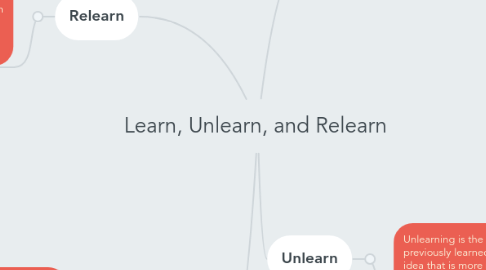
1. Relearn
1.1. Relearning is the process of acquiring new information on a previously known idea and adapting this new understanding with what was previously known and why this new meaning is more relevant to the current time (Klein, 2008).
1.1.1. Benefits: Relearning is a great opportunity for students to build upon what they have previously learned. Students are able to look at previously learned content and consider what new meanings it has with our current educational climate (Klein, 2008).
1.1.2. Challenges: Many challenges arise when teaching a student to relearn. First, we must get the students to buy in on this new approach to an old idea. To do this, students must be open to seeing topics from a different view and adapting their previous understanding. This is a struggle because many students are content with learning in one way and never have the drive to expose themselves to multiple views. It is the job of the teacher to make them passionate about this new learning.
2. Resources
2.1. Cirnu, C. E. (2015). The Shifting Paradigm: Learning to Unlearn. Internet Learning Journal, 4(1), 126-133.
2.2. Klein, E. J. (2008). Learning, unlearning, and relearning: lessons from one school's approach to creating and sustaining learning communities. Teacher Education Quarterly, (1),
2.3. Crockett, L., Jukes, I., & Churches, A. (2011). Literacy is not enough: 21st–century fluencies for the digital age. Thousand Oaks, CA: Corwin.
3. Learn
3.1. Learning is the process that a student or individual experiences when first experiencing a new topic or idea (Klein, 2008).
3.1.1. Benefits: A benefit of learning is the challenge of taking an idea completely unknown to you and mastering it. We must teach students in a way that they gain independence and bear the responsibility of the learning (Crockett, 2011)
3.1.2. Challenges: Achieving this is a complex task. Teachers must provide students ample opportunities and there must be support from the community to ensure that the students are self sufficient and no longer need us when they graduate from school (Crockett, 2011). This puts an enormous amount of pressure on all individuals responsible for the education of the child.
4. Unlearn
4.1. Unlearning is the idea of erasing what was previously learned and replacing it with the idea that is more relevant for an individuals situation (Klein, 2008).
4.1.1. Benefits: As a student progresses through life, the previous method they have once learned something may not apply to the current environment they live in. Due to technology and other advances, students must be constantly adapting their understanding in order to stay current with what they know. We must educate students to not fall back to this previous knowledge but instead grow into a deeper understanding of how it affects them (Cirnu, 2015).
4.1.2. Challenges: One of the major challenges posed by unlearning is in basic human behaviors. In times of stress and crisis, most individuals cave into older knowledge even if it is incorrect (Cirnu, 2015). We must provide our students the tools to not only unlearn, but trust that the comfort of this previously learned knowledge does not always lead to the best results.

